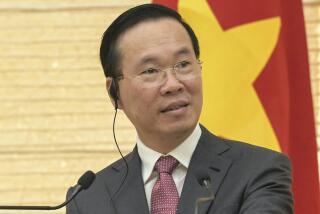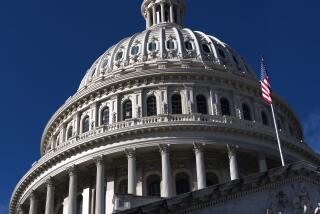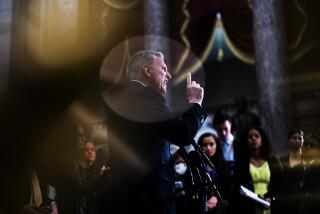China Shakes Up Party Leadership : Many Veteran Figures Shunted Aside to Accommodate Younger Deng Allies
- Share via
PEKING — The Chinese Communist Party announced the resignations Monday of more than 140 senior party leaders, a move aimed at transferring power from veteran revolutionaries to a younger generation of leaders.
After a series of meetings in the Great Hall of the People, the party’s Central Committee announced the most sweeping change in its top ranks in almost a decade. A statement by the Central Committee said that 10 of the 25 members of the ruling Politburo submitted their resignations, as did 64 of 346 full or alternate members of the Central Committee, the Communist policy-making body.
The statement also announced a series of changes in two less important party organizations. It said that 37 of the 162 members of the Central Advisory Commission will step down, as will 30 of the 129 members of the Central Commission for Discipline Inspection.
Long Prominent
Those losing their seats included some old figures who have played a prominent role in the Communist Party since the Chinese civil war of the 1930s and ‘40s such as Marshal Ye Jianying, 88, a powerful military leader, and Deng Yingchao, 81, China’s highest-ranking woman politician and the widow of Premier Chou En-lai.
Ye has been a major force in the People’s Liberation Army and in Communist Party politics since the Long March of 1934-35, which he helped orchestrate. He was the first Communist mayor of Peking and was a key player in the political turmoil between pragmatists and hard-liners after the death of Mao Tse-tung in 1976.
He has not been seen in public for two years and is reportedly near death. According to the statement released Monday, he did not attend the party meetings here.
The party changes appear to portend a forthcoming shift in some important government positions, as well. Among those who resigned from the Central Committee were Chinese Defense Minister Zhang Aiping, 75, who diplomats believe may soon give up the defense post, and Culture Minister Zhu Muzhi, 69.
In a joint letter of resignation, those stepping aside explained that they want the party to “take a giant step toward rejuvenation.” They said they hope their action will ensure that “de facto lifelong tenure in leading posts will be abolished and a system of constant renewal of members of the leading organs (of the party) will be established.”
Replacements to Be Named
Their replacements will be named during a special conference of 1,000 leading Communist Party officials that will begin here Wednesday. Analysts cautioned that until the names of these replacements are made public, it will be impossible to fully gauge the impact of the changes.
But most said that the resignations seem to signal a far-reaching victory for China’s top leader, Deng Xiaoping, in his effort to install pragmatic younger people who will perpetuate his campaign to modernize and reform the Chinese economy.
“I’d say it’s a major, unqualified success for Deng and the reformers at this stage,” a Western diplomat commented.
Some analysts also said the list of resignations indicated a drastic reduction in the political role of the Chinese army, which, over the last decade, has functioned as a powerful conservative influence within the Communist Party.
Of the 10 Politburo members who resigned, six were military officials. “They (the army) won’t be at the same strength after this,” an Asian diplomat said.
Open Challenge to Deng
In 1982, on the eve of the last Communist Party congress, army leaders mounted a serious challenge to Deng’s leadership, including an editorial in the newspaper Liberation Army Daily that openly questioned Deng’s effectiveness.
As a result, Deng was forced at that time to make so many compromises on personnel that a third of the new Politburo was composed of generals and approximately a quarter of the Central Committee members were active-duty officers.
Despite the avowed commitment to bring in younger leaders, the party Central Committee, in approving the resignations Monday, did not impose any specific retirement age on its members.
A number of older leaders will stay in their posts, including Deng himself, who is 81; President Li Xiannian, 76, and senior economic expert Chen Yun, 80.
All three will remain on the party’s highest-ranking body, the Standing Committee of the Politburo, along with Deng’s two top proteges--Communist Party General Secretary Hu Yaobang, 69, and Premier Zhao Ziyang, 66.
Until now, the Standing Committee has been made up of these five men and Ye Jianying. While the party announced Monday that Ye has stepped down, it did not say who, if anyone, will replace him on this key body.
Political Factors
Political considerations, rather than age, appeared to lie behind some of the resignations.
For example, among those giving up their Politburo seats was a once-powerful army general, Li Desheng, who came to prominence during the Cultural Revolution. And among those who resigned from the Central Committee was Wang Dongxing, who served as Mao’s bodyguard and security chief and was instrumental in 1976 in bringing to power Hua Guofeng, Mao’s immediate successor as party chairman. Both Li and Wang were born in 1916, the same year as Hu Yaobang.
But Deng and his aides did not go so far as to eliminate all sources of political opposition from the party leadership.
Hua, 64, who served as both Communist Party chairman and premier in the years between the death of Mao and the ascendancy of Deng’s top proteges, kept his seat on the Central Committee. Hu Qiaomu, 73, a powerful ideological opponent of Deng’s mixed economy, stayed on the Politburo.
According to Monday’s announcement, those who will retire from the Politburo include Ye, Deng Yingchao, Li Desheng, Marshal Xu Xiangqian, Marshal Nie Rongzhen, air force Gen. Zhang Tingfa, Gen. Wei Guoqing, Mongolian leader Ulanhu and veteran party officials Wang Zhen and Song Renqiong.
Among the 64 people stepping down from the Central Committee were Huang Hua, 72, who served as China’s foreign minister from 1976 to 1982, and Kang Keqing, 73, the widow of China’s revolutionary general Chu Teh.
More to Read
Sign up for Essential California
The most important California stories and recommendations in your inbox every morning.
You may occasionally receive promotional content from the Los Angeles Times.










